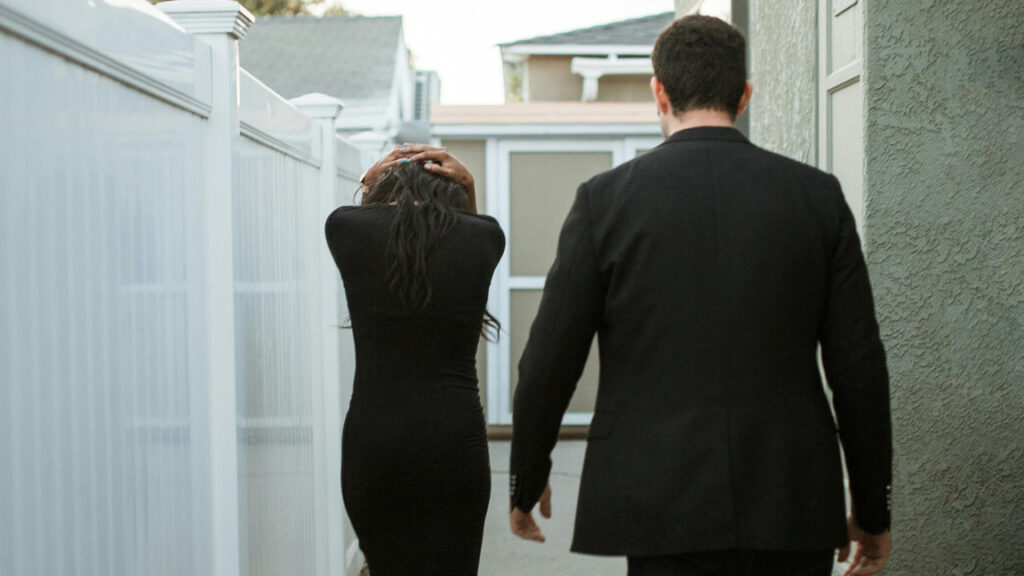A situationship starts when two people act like they’re in love — but no one’s brave enough to define it.
Are We Dating… or Just “Something”?
You talk every day. You laugh. You share playlists. Maybe you even hold hands sometimes. But deep down, there’s a nagging question you can’t silence:
“What are we?”
Welcome to the confusing, emotional maze of a situationship — the grey area between friendship and commitment that’s quietly redefining modern love. It’s not quite a relationship… but it’s definitely more than a fling. And for many, it’s become the new normal.
In an age of swipes, DMs, and emotionally distant texting, clear labels are out, and “vibes” are in. But here’s the problem: vibes don’t build trust. They don’t provide clarity. They don’t protect your heart.
So why are so many of us settling for something that looks like love but never really becomes it?
In this blog, we’ll break down everything — from the meaning of a situationship, to the red flags, the emotional toll, and how to get out of it without losing yourself.
If you’ve ever been stuck between almost and official, this one’s for you.
What is a Situationship, Really?
A situationship is a romantic connection without clarity, commitment, or a clear label. You might talk often, hang out like a couple, share late-night confessions — but when someone asks, “Are you two together?” you hesitate. Because even you don’t know.
It’s not just “friends with benefits.” It’s not exactly dating. It’s not even always physical.
A situationship lives in the gray zone — where emotions exist, but intentions hide.
In simple terms, a situationship is when you act like a couple but avoid the conversation that would make it official. There’s affection, effort, even routine — but no definition. And with that vagueness comes insecurity, overthinking, and confusion.
People often land in a situationship because it feels easier at first. There’s no pressure. No big conversations. No labels to scare anyone off. You enjoy each other’s company and convince yourself that things will “figure themselves out.” But slowly, the lack of clarity becomes a weight.
You find yourself second-guessing everything —
Do they really like me?
Should I ask where this is going?
Why do I feel anxious after something so good?
And here’s the twist: not having answers feels worse than hearing a “no.”
Psychologists call this a “liminal space” — a place between two states, where nothing is fully formed. In relationships, that space creates emotional instability. You’re not single, but you’re not taken. You’re emotionally invested, but afraid to ask for more.
In many ways, a situationship mirrors the instability of modern dating. Swipe culture has trained us to keep options open. We’ve begun avoiding hard conversations in the name of “going with the flow.” But behind the casual tone, someone always wants more — and someone else is too scared to give it.
So if you’ve ever wondered:
“Are we something… or are we just pretending not to be?”
You’re probably in a situationship.
Situationship vs Relationship: Key Differences
It may look like a relationship. It may even feel like one at times. But a situationship, at its core, is fundamentally different — not just in labels, but in intention, direction, and emotional safety.
Here’s a breakdown of what sets the two apart — and why confusing one for the other often leads to heartbreak.
1. Clarity vs Ambiguity
In a relationship, both partners know where they stand. They’ve had the talk, made decisions, and aligned on expectations.
A situationship, on the other hand, thrives in the shadows. You’re constantly unsure of where things are heading — or if they’re heading anywhere at all.
2. Open Communication vs Selective Honesty
Couples in healthy relationships speak honestly — even when it’s uncomfortable.
But in a situationship, important conversations are often avoided. Instead, there’s vague talk, deflection, or silence when you try to define things.
3. Future Planning vs Just the Moment
Relationships involve vision — from planning trips together to talking about the future.
In situationships, everything stays in the now. You make plans only a few days ahead. There’s no real long-term picture — just a repeating present.
4. Inclusion vs Isolation
In relationships, you’re part of each other’s lives — meeting friends, attending family events, being seen as a pair.
A situationship keeps you at a distance. You might never meet their inner circle or appear on their social media. It’s intimacy with boundaries.
5. Emotional Consistency vs Emotional Whiplash
A relationship offers emotional security. You feel seen, heard, and valued regularly.
In a situationship, connection often feels like a rollercoaster. One day, they’re deeply affectionate. The next, they pull away. You’re left decoding moods instead of feeling supported.
6. Labels vs Loopholes
A relationship usually comes with mutual definitions — partner, girlfriend, boyfriend, spouse.
A situationship hides behind phrases like “Let’s not rush things” or “Why label it?” These loopholes allow one or both partners to avoid responsibility.
7. Emotional Safety vs Emotional Confusion
In love, safety comes from trust and clarity.
In a situationship, you’re often walking on eggshells. You hesitate before texting too much. You wonder if you’re asking for too much. The emotional ground is never stable.
Final Word on This Section:
If you’ve been overthinking their words, questioning your worth, or afraid to ask where it’s going — chances are, you’re not in a relationship.
You’re in a situationship.
Knowing the difference isn’t just about dating. It’s about protecting your peace.

11 Clear Signs You’re in a Situationship 🚨
You keep telling yourself it’s fine.
You enjoy each other’s company.
But deep down, something doesn’t sit right.
If you’re constantly questioning whether this is love or just a confusing connection, here are 11 clear signs of a situationship — and none of them should be ignored.
1. There’s Chemistry, But No Clarity
You share real moments — laughter, closeness, even vulnerability. But whenever you try to define the relationship, the conversation magically disappears. The bond is real, but the label is always missing.
2. They Avoid the “What Are We?” Talk
Every time you bring up feelings or the future, they dodge it. You’re left with generic phrases like “Let’s just enjoy the moment” or “Why ruin a good thing?” That’s not honesty — that’s avoidance.
3. You Feel Anxious After the Good Times
Moments with them feel magical. But right after, anxiety kicks in. You replay everything, wondering if it meant as much to them as it did to you. That emotional crash is a classic situationship red flag.
4. There’s No Talk of the Future
Real relationships include plans — even simple ones like a weekend getaway. In a situationship, the future is foggy. Everything is last-minute, with no sense of direction.
5. You Haven’t Met Their Inner Circle
You’ve been seeing each other for weeks (maybe months), but you haven’t met their friends, let alone their family. They keep you in a separate box — close, but never integrated.
6. They’re Hot and Cold Without Explanation
Some days they’re all over you. Other days they vanish. You don’t know if you did something wrong — or if this is just how they operate. The inconsistency keeps you emotionally off balance.
7. You Hesitate to Speak Your Needs
You hold back. You don’t want to come across as needy or dramatic. So you stay silent, even when your heart wants answers. In real relationships, needs are discussed — not suppressed.
8. You Don’t Know Where You Stand
It’s been weeks, maybe months — but you still can’t answer the question: “Are we dating?” That uncertainty starts to eat away at your self-worth.
9. You Make Excuses for Their Behavior
They cancel last minute. They go days without texting. They avoid deep talks. And yet, you keep justifying it. “They’re just busy,” you tell yourself — even though it hurts.
10. You Feel Like You’re the Only One Trying
Whether it’s texting first, planning meetups, or keeping the emotional connection alive — it feels like the weight of the relationship is entirely on your shoulders.
11. You’re Always Guessing — Never Knowing
Above all, you’re stuck in a guessing game. Guessing how they feel. Guessing where you stand. Guessing what this is. A true relationship brings emotional safety — not emotional puzzles.
Final Reflection:
If more than a few of these signs feel uncomfortably familiar, chances are… you’re in a situationship, not a relationship.
And no, you’re not crazy — you’re just craving clarity in a space built on confusion.
The Psychology Behind Situationships 🧠
To understand why situationships are so common — and so difficult to escape — we have to look deeper than dating apps or vague texting. The root of this emotional pattern lies in human psychology — especially how we deal with fear, connection, and uncertainty.
1. Attachment Styles Shape Modern Dating
At the heart of every situationship is an unspoken imbalance — one person craves clarity, the other fears commitment. This often traces back to attachment styles formed in childhood.
- Avoidant types tend to fear losing independence. They resist labeling things and prefer emotional distance.
- Anxious types seek closeness and reassurance but often silence their needs to avoid being “too much.”
A situationship often happens when these two types collide — leading to emotional push-pull cycles that feel magnetic but never stable.
2. We Confuse Emotional Highs With Love
The unpredictability of a situationship creates emotional spikes. You don’t hear from them for days — then suddenly, they text and want to meet. That hit of dopamine makes you feel alive again.
But it’s not love — it’s a chemical reward loop.
This on-and-off attention mimics addiction patterns in the brain. You stay hooked not because it’s fulfilling, but because it’s unpredictable.
3. Dating Apps Encourage Emotional Ambiguity
Swipe culture has changed how we connect. There’s always “someone else” just one swipe away, which makes people less willing to commit.
Instead of working through emotional discomfort, many choose the easy route: stay in the middle — where you enjoy intimacy without responsibility.
Situationships thrive in this space. They offer just enough emotional engagement to keep someone around, but not enough to build anything lasting.
4. We Fear Labels More Than Loneliness
Many people have been hurt before — cheated on, ghosted, abandoned. So instead of risking heartbreak again, they stay in emotional limbo.
Labels feel dangerous. Vulnerability feels risky.
So we settle for something in-between, where nothing’s official — and nothing’s protected either.
It’s a form of emotional self-defense: “If we’re not official, I can’t really get hurt.”
But ironically, that very avoidance often causes deeper wounds.
5. Low Self-Worth Makes Us Tolerate Less Than We Deserve
If you’ve ever stayed in a situationship long after realizing it’s hurting you — you’re not alone.
When we doubt our worth, we accept crumbs instead of waiting for the whole meal.
We convince ourselves that “this is better than nothing” — when in truth, it’s slowly draining us.
Psychologically, this links to scarcity mindset — the fear that if you let go, nothing better will come. And that fear traps many in cycles they know aren’t right.
Final Insight:
A situationship doesn’t just happen by accident. It’s the result of deep psychological patterns — fear of loss, fear of intimacy, and the need to feel wanted… even when it’s not real.
Understanding this is the first step. Healing comes when you stop blaming yourself — and start recognizing the emotional patterns at play.

Why Situationships Can Be Emotionally Damaging 🩹
At first, a situationship may seem easy, chill, even exciting — but beneath the surface lies an emotional cost most people don’t expect until it’s too late.
Unlike traditional relationships, where emotional security grows with clarity and commitment, a situationship keeps your heart on a leash without ever promising safety. You feel emotionally connected, but not emotionally protected — and that gap can quietly wear down your mental well-being.
1. Uncertainty breeds anxiety
One of the most harmful aspects of a situationship is the constant ambiguity. You don’t know where you stand. You’re unsure if the other person is seeing someone else. And every small shift in tone, reply time, or mood can spiral into overthinking.
This state of “emotional limbo” activates the brain’s threat detection system. According to psychologists, unpredictability in close relationships can increase cortisol levels, a stress hormone linked to anxiety, insomnia, and emotional fatigue.
You’re not just confused — your nervous system is exhausted from living in a state of constant alert.
2. Emotional investment without return
You spend time. You make effort. You open up emotionally. But unlike a relationship, where vulnerability is reciprocated, a situationship often offers emotional intimacy without emotional responsibility.
You give more than you get — and deep down, you know it. That silent imbalance builds resentment, loneliness, and self-doubt over time.
3. Invisibility in their life
One silent heartbreak of being in a situationship is feeling invisible in their world. You may not be introduced to their friends or family. You avoid posting pictures together. Your connection exists in private, never public.
This invisibility isn’t just social — it begins to affect your self-worth. You start wondering:
Why am I not enough to be acknowledged?
Am I something to hide?
4. The fear of asking for more
In a situationship, people often suppress their true feelings just to “keep things going.” You stop yourself from asking, “What are we?”, fearing the answer might end it all. But that emotional silence slowly becomes self-abandonment.
You lose your voice. You shrink your needs.
And pretending to be okay eventually starts hurting more than the truth ever could.
5. Delayed healing and lingering confusion
When a situationship ends, it rarely ends clean. Since there was no clear beginning, there’s often no official breakup either. This lack of closure leaves emotional loose ends — questions, regrets, and what-ifs that stay for weeks or months.
You can’t heal what was never clearly defined.
Psychologically, this type of ambiguous loss is known to create prolonged grief, even more painful than traditional heartbreak — because it’s hard to mourn something you were never allowed to fully call yours.
Final Thought for This Section 💔
The emotional damage of a situationship isn’t always dramatic. It’s subtle. It seeps in slowly — through every unanswered text, every missed label, every conversation you avoid having. Over time, it rewires how you see yourself, how much you ask for, and what you begin to tolerate in the name of “almost love.”
You deserve more than almost.
You deserve certainty, care, and commitment.
How to Know It’s Time to Walk Away ⏳
Staying in a situationship for too long can feel like clinging to a boat with no anchor — drifting endlessly, hoping it finds shore. But there comes a moment when your heart starts whispering the truth: this isn’t love… it’s limbo.
Here are the clear emotional and behavioral signs that it’s time to let go — even if it hurts:
1. You’re Always Anxious About Where You Stand
If every interaction leaves you wondering, “Do they even care?”, it’s not just anxiety — it’s emotional neglect. A real relationship brings reassurance. A situationship keeps you in a loop of constant self-doubt.
2. Conversations About “Us” Always Get Dodged
You’ve tried bringing it up. The “What are we?” talk. And every time, they either change the subject or give vague answers. If clarity scares them more than losing you, that’s your answer.
3. You’re Putting in 90%, They’re Giving 10%
Love should feel mutual. If you’re always texting first, planning meetups, and emotionally investing — while they stay detached — you’re not in a relationship. You’re in emotional labor.
4. You Feel Drained, Not Fulfilled
Healthy love energizes you. Situationships exhaust you. If your connection leaves you more confused than comforted, it’s taking more than it’s giving.
5. You Keep Making Excuses for Their Behavior
“I know they’re just busy.”
“They’re not ready right now.”
“They’re scared because of past trauma.”
If you’re constantly rationalizing their silence, indifference, or inconsistency — you’re ignoring your own needs.
6. You Can’t Imagine a Future With Them
When you think about next year, or five years from now — are they in that picture? Or does everything feel temporary? Real love creates dreams. Situationships avoid commitment at all costs.
7. You’re Afraid to Be Honest About Your Feelings
You silence your emotions because you’re scared it’ll “push them away.” But love shouldn’t feel like walking on eggshells. If you can’t express how you feel, you’re not safe emotionally.
8. Your Self-Worth Is Slowly Fading
The longer you stay, the more you start believing you’re “too much” or “not enough.” That inner voice that once knew your value? It’s now whispering doubt.
9. You’re Staying Because You Hope They’ll Change
Hope is beautiful — but it’s not a relationship plan. If you’re holding on only because you think they’ll magically become what you need… that fantasy may cost you your peace.
10. You’re Afraid of Being Alone
Sometimes, we choose confusion over loneliness. But being alone and growing is far better than being with someone who keeps you stuck.
11. The Pain of Staying Has Become Greater Than the Fear of Leaving
This is the moment of truth. If staying hurts more than the heartbreak of leaving, your soul is already begging for freedom.
You deserve clarity. You deserve mutual love. You deserve peace.
If someone isn’t choosing you fully — it’s okay to choose yourself.
Frequently Asked Questions About Situationships (FAQ)
1. What is a situationship in simple words?
A situationship is a romantic connection without clear labels or commitment. You act like a couple, but without calling it a relationship — it’s emotional, undefined, and often confusing.
2. Why do people stay in situationships?
Most people stay in situationships because they fear losing the connection, hope it will turn into something real, or are afraid of being alone. Emotional attachment makes it hard to walk away.
3. Can a situationship turn into a serious relationship?
Yes, but only if both people clearly want it and are emotionally ready. Without mutual commitment and honest communication, most situationships stay stuck in the “almost” phase.
4. How do I know I’m in a situationship?
If there’s no clarity, no commitment, and you constantly feel unsure about where you stand, you’re likely in a situationship. Mixed signals and emotional inconsistency are key signs.
5. How long do situationships usually last?
Some last weeks, others go on for years. Most continue until one person sets a boundary or decides to leave. The longer it goes without clarity, the harder it is to walk away.
6. Is a situationship bad for mental health?
Yes, it can be. The emotional confusion, anxiety, and lack of closure often lead to low self-worth, overthinking, and heartbreak. It’s emotionally draining over time.
7. Why are situationships becoming so common today?
Dating apps, hookup culture, fear of commitment, and emotional unavailability have made casual, undefined connections more common — especially among Gen Z and millennials.
8. What’s the biggest risk of a situationship?
The biggest risk is losing your emotional peace while waiting for someone who may never choose you. It delays your healing and blocks you from real love.
9. How do I move on from a situationship?
Accept the truth, stop hoping for change, express your emotions (journal, talk, cry), and create space for healing. Unfollow them if needed. You deserve clarity and closure.
10. Does the other person in a situationship feel the same confusion?
Sometimes yes, but often no. Many people in control of the situationship feel comfortable with the emotional benefits — while the other person silently struggles and hopes for more.
🎯13. Final Thought: Loving Without Labels Hurts Most
A situationship is not just a “modern love trend” — it’s emotional limbo.
You give your time, energy, and heart to someone… but never really feel seen, chosen, or secure.
And the worst part? You keep waiting for clarity that never comes.
Let’s be honest — love without labels may sound fun at first, but deep down, most of us crave consistency, respect, and emotional safety.
You deserve a connection that’s not confusing. You deserve a love that’s not afraid to name itself.
If it feels like you’re begging for crumbs, it’s not love — it’s emotional starvation.
💬 CTA: Share Your Experience or Ask for Support
Ever been in a situationship that hurt more than it helped?
Share your story in the comments — or reach out if you’re struggling to walk away.
Let’s help each other heal, grow, and choose better. 💖
💣 Think It’s Just a Situationship… or Is It Love Bombing?
Sometimes, what starts as intense affection quickly turns into emotional control.
If you’re being showered with too much love too fast, pause and read this:
👉 Love Bombing: The Hidden Trap of Emotional Control
And for more powerful insights on love, heartbreak, and healing, follow us on Facebook:
📲 E-Vichar Facebook Page




